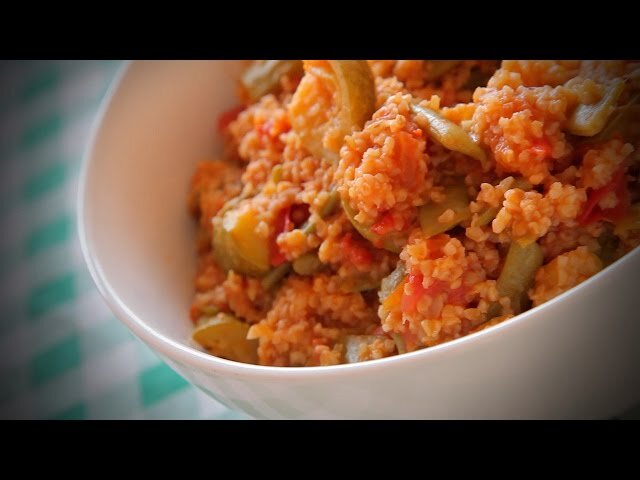That Translator Can Cook: Shulbato
A warm vegetarian grain bowl comprising red bulgur or freekeh, eggplant, onion, tomato, chickpeas, garlic, and various spices.
Image Source: Flipboard
I have been eating more vegetarian meals, especially those that are high in fiber, and it has done wonders for my health, so I had to try this recipe. Even though it is traditionally made with red bulgur, I chose this recipe because I love freekeh. So delicious.
I made the mistake of making shulbato as an entrée even though it’s a side dish because as an entrée, it provides you waaay too much fiber. Stick to eating shulbato as a side dish. I tried doing this crazy thing because I’ve made the commitment to eat more vegetables and whole grains and less meat and refined grains. I’ve lost five pounds without ever trying to lose weight because I’ve been replacing one of my prepared meals with a high-fiber vegetarian meal instead my typical meat and rice/pasta meal. I won’t bore you with all the benefits that eating vegetables give you because there’s too many. I will, however, bore you with why eating whole grains rather than refined grains is good for you.
First off, eating whole grains means you eat all parts of the grain: bran (outer shell), endosperm (middle layer), and germ (inner layer). White bread and pasta are refined grains because the bran and the germ are removed during their processing. The germ is the part that holds the minerals, vitamins, and proteins. You should eat more whole grains because they:
are high in fiber, vitamins (B), minerals, proteins, antioxidants, and plant compounds
lower your risk of heart disease, obesity, type 2 diabetes, and stroke
support healthy digestion
reduce chronic inflammation and may reduce your risk of cancer
are linked to a reduced risk of premature death
That being said, whole grains are not compatible with those who have celiac disease or a gluten sensitivity, or those with irritable bowel syndrome.
Here is how to make this healthy dish (recipe belongs to Hamoudi Muftagi):
Steps
50 minutes
In a pot on the stove, heat the oil then add the onions. Stir until they soften and then add the garlic; stir for a bit; and then add the tomatoes.
When the tomatoes start to boil, add the cubed eggplants and stir for a bit. Next, add the boiled chickpeas, salt, cumin, and black pepper and stir for a bit.
Add the freekeh and the cup and a half of water. Stir for a bit until the ingredients boil; then, reduce heat, cover the pot, and let it simmer until the freekeh is completely cooked. Sprinkle some pepper over it.
Take the pot off heat and let it sit for 10 minutes before serving, then serve the shulbato.
Ingredients
2 medium onions, diced
4 cloves of garlic, minced
4 large tomatoes, diced
2 eggplants, peeled, cubed, and soaked in water so that it doesn’t blacken
1 cup of chickpeas, boiled
1½ cups of freekeh, washed and filtered
1 teaspoon of ground black pepper
1 teaspoons of ground cumin
1 teaspoon of salt
1 tablespoon of vegetable oil
1½ cups of water
Translators’ Discussion
The only big question I have is for Arabic translators: how do you translate قلب_يقلب in a cooking context? Stir? Toss?

